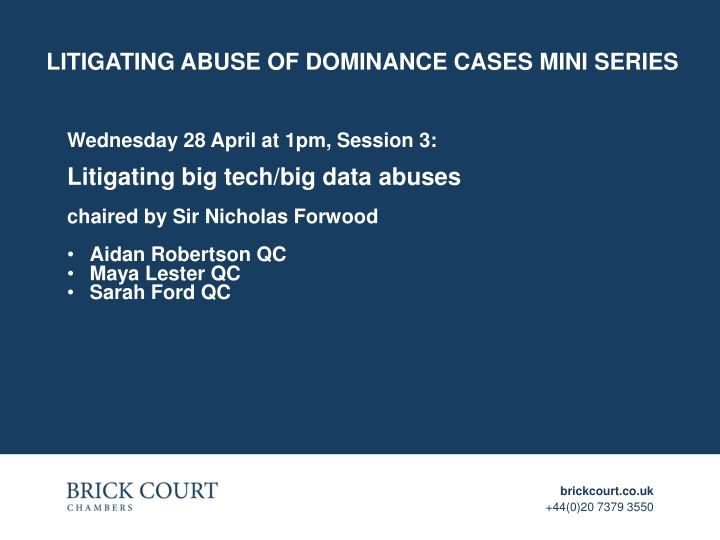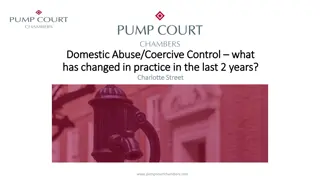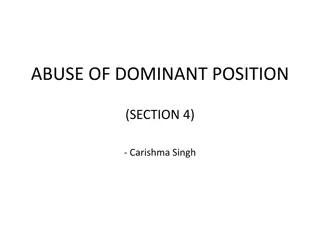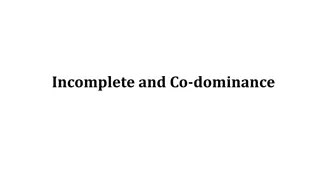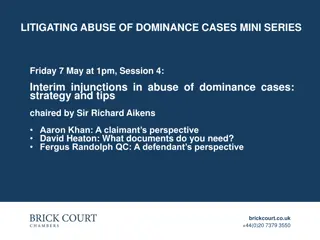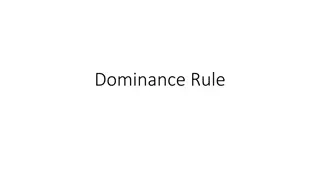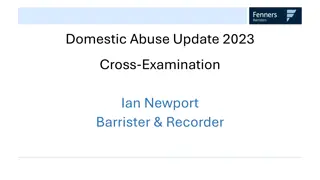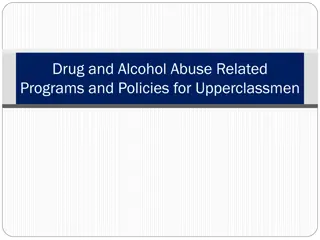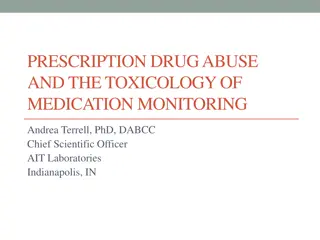Litigating Abuse of Dominance Cases Mini Series
In-depth sessions on litigating big tech/data abuses, regulatory appeals, and more in abuse of dominance cases. Explore FRAND, market definition, and legal perspectives with leading QCs and judges. Dive into practical strategies and tips for successful litigation in this complex legal landscape.
Download Presentation

Please find below an Image/Link to download the presentation.
The content on the website is provided AS IS for your information and personal use only. It may not be sold, licensed, or shared on other websites without obtaining consent from the author.If you encounter any issues during the download, it is possible that the publisher has removed the file from their server.
You are allowed to download the files provided on this website for personal or commercial use, subject to the condition that they are used lawfully. All files are the property of their respective owners.
The content on the website is provided AS IS for your information and personal use only. It may not be sold, licensed, or shared on other websites without obtaining consent from the author.
E N D
Presentation Transcript
LITIGATING ABUSE OF DOMINANCE CASES MINI SERIES Wednesday 28 April at 1pm, Session 3: Litigating big tech/big data abuses chaired by Sir Nicholas Forwood Aidan Robertson QC Maya Lester QC Sarah Ford QC brickcourt.co.uk +44(0)20 7379 3550
LITIGATING ABUSE OF DOMINANCE CASES MINI SERIES Monday 12 April at 5pm, Session 1: Recap on main substantive developments of practical interest for litigation, chaired by Dame Kelyn Bacon DBE Thursday 22 April at 1pm, Session 2: Abuses & pharmaceuticals: recent & current issues in litigation, chaired by Lord Anderson of Ipswich KBE QC Wednesday 28 April at 1pm, Session 3: Litigating big tech/big data abuses, chaired by Sir Nicholas Forwood Friday 7 May at 1pm, Session 4: Interim injunctions in abuse of dominance cases: strategy and tips, chaired by Sir Richard Aikens Tuesday 11 May at 1pm, Session 5: Regulatory appeals, chaired by Sir Gerald Barling brickcourt.co.uk +44(0)20 7379 3550
LITIGATING ABUSE OF DOMINANCE Article 102 TFEU and FRAND Sarah Ford QC brickcourt.co.uk +44(0)20 7379 3550
DOMINANCE Market definition: the market for the licensing of each SEP Licensor has 100% market share AG Wathelet in Huawei v ZTE at [57]-[58]: the fact that an undertaking owns an SEP does not necessarily mean that it holds a dominant position within the meaning of Article 102 TFEU If the fact that anyone who uses a standard set by a standardization body must necessarily make use of the teaching of an SEP, thus requiring a licence from the owner of that patent, could give rise to a rebuttable presumption that the owner of that patent holds a dominant position, it must, in my view, be possible to rebut that presumption with specific, detailed evidence. brickcourt.co.uk +44(0)20 7379 3550
Birss J in Unwired Planet at [656], [665] and [669]: in my judgment, the FRAND undertaking does operate as a practical constraint on a SEP owner s market power, which is what it was intended to do. In a relevant market FRAND does give buyers a form of market power they would not otherwise have which they can and do wield. there is clear potential on theoretical grounds for hold-out to occur. overall there is evidence of holding out in practice but it is less strong than Unwired Planet submit. brickcourt.co.uk +44(0)20 7379 3550
ABUSE: EXCESSIVE PRICING Birss J in Unwired Planet at [757] and [765]: the boundary of what is and is not a FRAND rate is different from the boundary of what is and is not an unfair price contrary to Article 102(a). If the rate imposed is FRAND then it cannot be abusive. But a rate can be higher than the FRAND rate without it being abusive too. In the context of SEPs and FRAND, as long as the recipient of the offer can see it is made in that context, then it seems to be that only an offer which is so far above FRAND as to act to disrupt or prejudice the negotiations themselves will fall foul of Article 102(a). brickcourt.co.uk +44(0)20 7379 3550
ABUSE: PREMATURE LITIGATION CJEU in Huawei v ZTE at [71]: the proprietor of an SEP, which has given an irrevocable undertaking to a standardisation body to grant a licence to third parties on FRAND terms, does not abuse its dominant position by bringing an action for infringement seeking an injunction prohibiting the infringement of its patent as long as: prior to bringing that action, the proprietor has, first, alerted the alleged infringer of the infringement complained about by designating that patent and specifying the way in which it has been infringed, and, secondly, after the alleged infringer has expressed its willingness to conclude a licensing agreement on FRAND terms, presented to that infringer a specific, written offer for a licence on such terms, specifying, in particular, the royalty and the way in which it is to be calculated, and where the alleged infringer continues to use the patent in question, the alleged infringer has not diligently responded to that offer, in accordance with recognised commercial practices in the field and in good faith, this being a matter which must be established on the basis of objective factors and which implies, in particular, that there are no delaying tactics. brickcourt.co.uk +44(0)20 7379 3550
Supreme Court in Unwired Planet at [157]: [The CJEU s judgment in Huawei v ZTE] provides the SEP owner with a route map which, if followed precisely, will ensure it can seek an injunction without risking infringing Article 102, and otherwise provides a number of points of reference to assist in assessing the all-important question of whether each of the parties is willing to enter into a licence on FRAND terms. Interpreted in this way, it has sufficient flexibility built into it to cater for the inevitable variations that will occur from case to case, and from country to country. brickcourt.co.uk +44(0)20 7379 3550
FORTHCOMING CASES: OPTIS v APPLE Trial F (July 2021): Is a potential licensee an unwilling licensee because it has not committed to enter into whatever licence the Court settled was FRAND? Is it abusive for the SEP owner to seek to compel the implementer to commit to a licence before it has received an offer on FRAND terms or knows what the FRAND terms are? Trial E (June 2022): Alleged excessive pricing Alleged bundling Alleged discrimination brickcourt.co.uk +44(0)20 7379 3550
FORTHCOMING CASES: WHICH? v QUALCOMM Application to commence proceedings under s. 47B Competition Act 1998. Standalone claims for damages caused by alleged infringements of Article 102 and the Chapter II Prohibition. Allegation that the Respondent/Proposed Defendant has leveraged a dominant position in the supply of LTE chipsets to force smartphone manufacturers across the industry to pay supra-competitive royalties for patents and refused to licence rival chipset manufacturers under its patents. Proposed class: all consumers who purchased LTE-enabled Apple and Samsung smartphones since 1 October 2015. Relief sought: aggregate award of damages. brickcourt.co.uk +44(0)20 7379 3550
LITIGATING ABUSE OF DOMINANCE Article 102 TFEU and BIG TECH: ISSUES FOR LITIGATORS Maya Lester QC brickcourt.co.uk +44(0)20 7379 3550
COMPETITION LAW & BIG TECH Regulatory investigations into digital markets: Microsoft Google, Apple, Facebook, Amazon. Article 102 TFEU: abuse of dominance What are the issues? Is Article 102 TFEU enough? Proposals for new regulatory framework brickcourt.co.uk +44(0)20 7379 3550
EU & UK DECISIONS Google Search (Shopping) Commission Decision 27 June 2017 Google Android Commission Decision 18 July 2918 Google Search (AdSense) Commission Decision 20 March 2019 TwoCommission investigations into Amazon (data SO November 2020) German Facebook judgment(Dusseldorf Higher Regional Court 26 August 2019) Streetmap.EU Ltd v Google Inc [2016] EWHC 253 (Ch) JJH Enterprises Ltd v Microsoft brickcourt.co.uk +44(0)20 7379 3550
ISSUES FOR LITIGATORS Funding Incentives on both sides Information asymmetry Court or regulator or both? Which court / tribunal? Defendants & jurisdiction Market definition & dominance Abuse & theories of harm Objective justification Causation Remedies brickcourt.co.uk +44(0)20 7379 3550
LITIGATING ABUSE OF DOMINANCE IMPLICATIONS OF THE NEW UK DIGITAL MARKETS REGIME Aidan Robertson QC brickcourt.co.uk +44(0)20 7379 3550
INTRODUCTION Furman Report Unlocking digital competition, Report of the Digital Competition Expert Panel, March 2019 CMA s Market Study Online platforms and digital advertising July 2020 Found that competition is not working well in these markets, consumer harm Considered the problems and interventions necessary to deal with problems in the digital advertising market, particularly Google and Facebook Recommended that the government passes legislation to establish a new pro- competition regulatory regime Digital Markets Taskforce (DMTF) announced in the Budget in March 2020 to provide advice to Government on the functions, processes and powers needed to promote effective competition in digital markets DMTF led by the CMA but supported by expertise from Ofcom and the Information Commissioner s Office brickcourt.co.uk +44(0)20 7379 3550
DMTF REMIT Do consumers have adequate control over use of their data by online platforms? Whether a lack of transparency, conflicts of interest, and the leveraging of market power undermine competition in digital advertising? Set a code of conduct for companies with Strategic Market Status (SMS) setting out how these companies should act with respect to smaller firms and consumers Pursue data interoperability, mobility and systems with open standards between platforms, products and services to promote innovation and consumer choice, and address specific competition issues in digital platform markets Pursue secure access to non-personal and anonymised data where data access represents a significant barrier to entry for smaller and newer firms, while protecting privacy and security brickcourt.co.uk +44(0)20 7379 3550
DMTF DMU DMTF has issued advice to Government on the design and implementation of the UK s proposed new pro-competition regulatory regime for digital markets CMA opened an investigation in January 2021 into Google s proposals to remove third party cookies and other functionalities from its Chrome browser Privacy Sandbox impact on newspaper publishers, digital advertising, privacy CMA's Digital Markets Strategy: February 2021 refresh New Digital Markets Unit (DMU) established within the CMA in April 2021 initially on a non-statutory basis Legislation to establish the regime Queen s Speech 11 May 2021 What will the regime look like? What implications does it have for antitrust litigation in the UK? brickcourt.co.uk +44(0)20 7379 3550
STRATEGIC MARKET STATUS DMU s main focus is on the SMS regime Methodology and procedure for designating platforms with SMS, and scope of regime overall within which SMS may be established Form and content of a pro-competitive Code of Conduct, including interactions with other proposed codes and regulation, & the powers to operate and enforce it In addition to the code, the market study proposed that the DMU have the power to introduce pro-competitive interventions to transform competition in digital platform markets Whether there is a case for other remedies such as data access and interoperability for those with SMS Interaction with wider digital and competition policy, other objectives including economic growth, innovation, data strategy, privacy, safety online brickcourt.co.uk +44(0)20 7379 3550
STRATEGIC MARKET STATUS What are the appropriate criteria to use when assessing whether a firm has SMS? Furman Report refers to significant market power, strategic bottleneck , gateway , relative market power and economic dependence and asks how these terms should be interpreted and how they relate to each other, and what role, if any, should each concept play in the SMS criteria? What are the steps required to bring a platform firm into scope of the DMU, by designating it as having SMS ? Opening a designation process, consulting on a provisional decision, publishing a reasoned decision on SMS, and providing an avenue to appeal designation brickcourt.co.uk +44(0)20 7379 3550
CODE OF CONDUCT Mandatory Code of Conduct Powers given to the DMU to suspend, block and reverse decisions of SMS firms and order conduct in order to achieve compliance with the code Principles based through Objectives Future proof against rapid market change Backed up by guidance to give greater clarity Apply to platforms with strategic market status (market power, gateway function) DMU thinks Google and Facebook have SMS against any reasonable test Other firms may also have SMS overall total 5 or 6? brickcourt.co.uk +44(0)20 7379 3550
CODE OBJECTIVE 1 FAIR TRADING Fair trading principles are intended to address concerns around the potential for exploitative behaviour on the part of the SMS platform Data gathering from business customers Concerns relating to exploitation of auction algorithms Unfair balance of power between publishers and platforms brickcourt.co.uk +44(0)20 7379 3550
CODE OBJECTIVE 2 OPEN CHOICES Open choices principles are intended to address the potential for exclusionary behaviour, covering both contractual and technological restrictions Self-preferencing in adtech and specialised search Restrictions on interoperability with Facebook De facto requirement to use AMP (Google s Accelerated Mobile Pages) and IA (Facebook s Instant Articles) formats Restrictions in syndication agreements brickcourt.co.uk +44(0)20 7379 3550
CODE OBJECTIVE 3 TRUST AND TRANSPARENCY The trust and transparency principles are designed to ensure that SMS platform provides sufficient information to users, so that they are able to make informed decisions. Changing how core services work without due notice (e.g. algorithms) Lack of transparency in digital advertising (fees, verification) Use of choice architecture to nudge users (e.g. consumers and advertisers) towards platforms preferred choices brickcourt.co.uk +44(0)20 7379 3550
CODE MONITORING AND INVESTIGATION Once a code is in operation Monitoring and investigation Monitoring and enforcement of codes, including mandatory review timelines, triggers Process steps for enforcement, such as a provisional decision, consultation How should the code be applied, including the legal tests for breach and potential role for burden shifting? Role of guidance on code compliance and enforcement What information gathering powers should be granted and processes to follow? brickcourt.co.uk +44(0)20 7379 3550
CODE REMEDIES - PUBLIC Use of interim code orders ( interim measures ) Final code orders and enforceability/penalty Appeals against interim and final code orders Availability of fines for breaches of code brickcourt.co.uk +44(0)20 7379 3550
CODE REMEDIES PRIVATE Potential role for private enforcement of code, including damages SMS = dominance? Breach of code = abuse? Abuse by object? Collective proceedings under s47B on behalf of businesses, consumers? Follow-on from finding of code breach? Standalone collective proceedings see Gutmann v SW Trains Measure of damages Restitutionary damages disgorgement of profits Time to revisit Devenish Nutrition? Mulheron Restitutionary relief in competition law class actions: an evolving landscape (2018) 26 Restitution Law Review 1 brickcourt.co.uk +44(0)20 7379 3550
